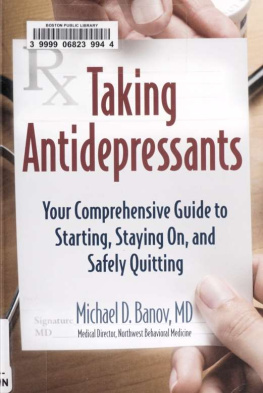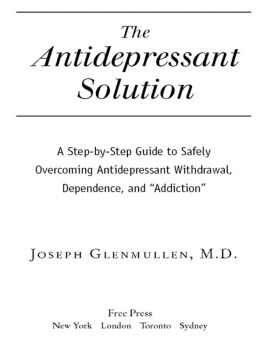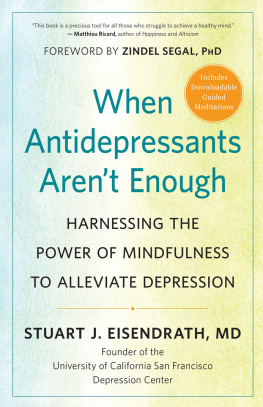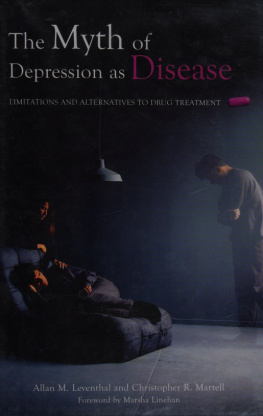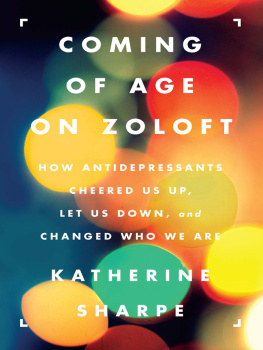This book made available by the Internet Archive.
Dedication
To my patientswho taught me everything I know about medicine
Acknowledgments
I would like to thank all the staff at Northwest Behavioral Medicine and Research Center in Marietta and Alpharetta, Georgia, for their support and time dedicated to me and our patients that really made collecting the information for this book possible. My experienced and reliable clinical nurse specialists Cathie Preston and Karen Greenhood for their input and manuscript review. Lisa Tener for her editorial comments and general guidance making this information consumer-friendly. Regina Brooks of Serendipity Literary Agency and Karin Craig at Sunrise River Press for believing in this topic and my ability to communicate this information. Christopher Hilton and Emily Siegel for their assistance in research. Dr. Warren Kaplan for manuscript suggestions. Charles and Nancy Banov for their ongoing love and encouragement for this project. Yadin Kaufrnann for sharing his publishing pearls. Elizabeth Johnsboen for contributing to the cover design. Michael Swain for illustrations. And, most importantly, my wife Lisa Banov and sons, Zachary and Jacob Banov, for toleratingand encouragingmy late-night kerplunking.
About the Author
Michael Banov, MD, completed his psychiatry training at McLean Hospital, Harvard Medical School, and is medical director of Northwest Behavioral Medicine and Research Center in Atlanta, Georgia. He has been a principal investigator in hundreds of psychiatry studies and has published dozens of articles and research papers on the treatment of mental-health problems. He is the founder and director of psychsource.org, a non-profit organization dedicated to helping people find appropriate mental-health resources in their area. When not practicing medicine, he is traveling, writing, playing guitar, and practicing martial arts.
Dr. Banov has served on advisory, consulting, and speaking boards for the following pharmaceutical companies: Astra-Zeneca, Eli Lilly, Pfizer, Wyeth, Forest, Bristol Myers Squibb, and GlaxoSmithkline. He has conducted clinical research studies for Astra-Zeneca, Eli Lilly, Pfizer, Janssen, Wyeth, Forest, Bristol Myers Squib, Otsuka, Shire, Novartis, Sanofi Adventis, GlaxoSmithkline, and Solvay. He has no major financial holdings in any pharmaceutical or medical device company. More information is available at www.psychatlanta.com.
References for studies are available at www.takingantidepressants.com.
Introduction
Depression is a common condition, and more people are being diagnosed and treated than ever before. Nearly one in four women and one in ten men will suffer from depression at some point in their lives. The impact depression has on your life and the lives of those who care about you can be profound. The World Health Organization reports that depression is the second leading cause of disability worldwide and, by 2020, is estimated to be the leading cause of disability. The good news is that recent advances in treatments have given doctors better tools to identify depression than even just a few years ago, and more effective treatments are now available.
Your challenge is finding the right treatment for you. fhere are many ways to successfully overcome depression, yet each has limitations and liabilities. Antidepressant treatment has become one of the more popular treatments over the last several decades. In fact, antidepressants are the most commonly prescribed class of medications in many of the developed nations of the world. Despite 50 years of antidepressant experience and millions of people having been successfully treated with these medicines190 million prescriptions were written each year in the United States alone since 2005their use still raises many questions and concerns. These include:
How do I know when I need an antidepressant?
How do I know which antidepressant to take and how do I start it?
How do antidepressants work?
Are antidepressants safe?
Are antidepressants effective?
Are antidepressants habit forming?
What if the antidepressant does not work?
When and how do I stop an antidepressant?
Taking Antidepressants answers these and many other questions about antidepressant treatment.
Surprisingly, there are few reliable resources that educate consumers about depression and its treatments in a fair and balanced fashion. Most books about antidepressants on the market today have a strong bias regarding their use. Some are decidedly against antidepressants and paint them as overused and dangerous drugs. In a few cases, authors do not accept that depression and other mental-health problems are even true medical conditions. Other authors are too biologically focused; they see pharmacological intervention as the only reliable means to overcome depression. I wrote Taking Antidepressants as a research psychiatrist
INTRODUCTION
who also spends most of his professional time treating real-world patients and looks at depression and antidepressant use from a practical, clinical perspective. This book educates you about current depression research and its limitations. You will learn what most doctors do to help their patients get better and, if possible, eventually get off medication.
Taking Antidepressants walks you through all phases of antidepressant therapy and gives you a personalized process to make the best choices about:
Starting antidepressants.
Staying on antidepressants.
How and when to safely stop taking your antidepressant.
You will learn about different kinds of depression and how mood disorders can impact your brain and body. Taking Antidepressants offers tips and tools for helping you identify whether you really have depression and whether you should consider antidepressant treatment. There are suggestions for helping you decide with your doctor which antidepressant to take and what to expect when first starting the medicine. Non-medication depression therapies to be used alone or with antidepressants are reviewed as well.
If you are already taking antidepressants, youll find a section dedicated to issues that often arise during treatment. This includes information on managing side effects and concerns about long-term safety. You will discover interventions that can help you if your medicine is only partially effective or stops working. There are suggestions for dealing with unexpected problems that can occur, such as pregnancy, traveling out of the country, or being unable to afford your medication. Finally, the last part of this book addresses how to decide when you may be able to safely stop your antidepressant treatment. You will learn how to work with your doctor to develop a dosage taper schedule to increase your likelihood of success in coming off the medicine, as well as tools to help you stay well after coming off antidepressants.

